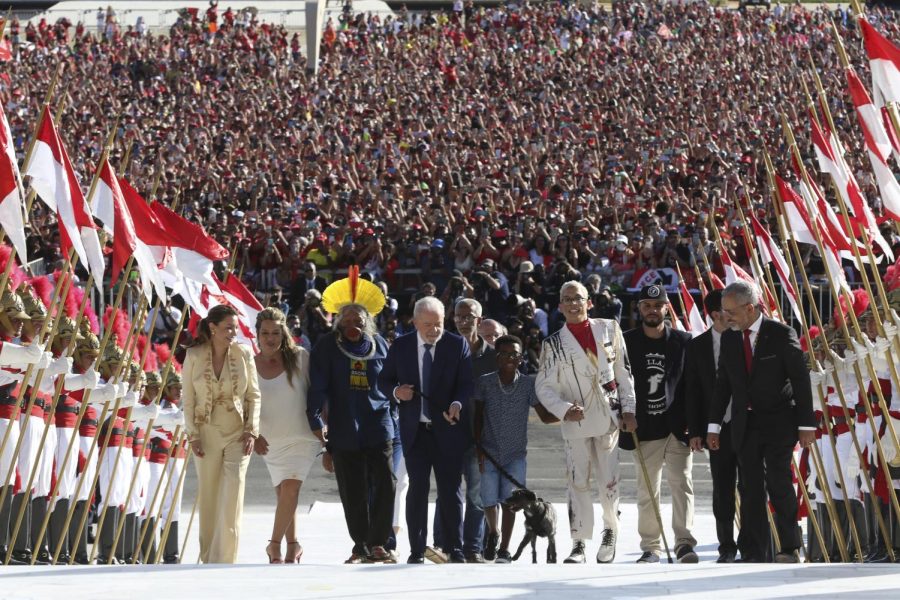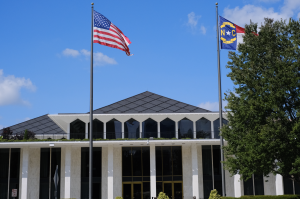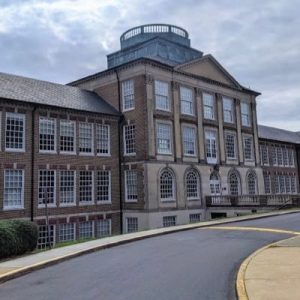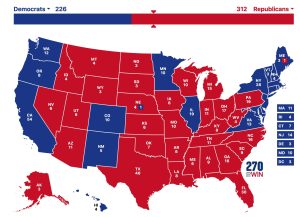Brazil’s new president has his work cut out for him
Lula must tackle issues ranging from insurrections to economic and environmental struggles
Luiz Inácio Lula da Silva is sworn in as Brazil’s president.
January 27, 2023
Luiz Inácio Lula da Silva, better known as Lula, was inaugurated as the president of Brazil for a third time on Jan. 1 amid fears of violence from supporters of former president Jair Bolsonaro. Following Bolsonaro’s far-right administration, Lula’s surprise comeback victory in a close run-off election on Oct. 30, 2022, signified the left’s return to power.
Lula’s inauguration was a lavish affair that included a motorcade, a music festival and hundreds of thousands of fans who filled the capital’s main promenade. It concluded a historic political comeback for the once most-popular president of Brazil. However, the elaborate event was missing one key player — the former president, Jair Bolsonaro. Bolsonaro was expected to hand Lula the presidential sash on Sunday, a symbolic representation of the peaceful transfer of power in Brazil since the end of its 21-year military dictatorship that ended in 1985. One would think that with such an important role, Lula’s predecessor would be the first one there, and yet, he could not have fled the country fast enough.
Bolsonaro was nowhere near Lula’s inauguration, as he had booked a flight to Florida that departed the Friday prior. He is staying in a rented house located a few miles from Disney World for a whole month as he refuses to publicly give up his power in office. When he lost the election this past October, Bolsonaro refused to make a clear concession. In the final months of his presidency, he expressed doubt in Brazil’s electoral institutions, yet did not provide any evidence to support this belief.
Bolsonaro avoided his responsibilities to Brazil because he believed that the elections he had clearly lost were unfair and faulty. Not only were Bolsonaro’s accusations unfounded and baseless, but he never mentioned any of these concerns during his term as president. He does not come off as a victim of an unfair electoral process, but rather as a sore loser unable to show the grace and diplomacy that is to be expected from someone in his position. Bolsonaro stated on Dec. 30, 2022, that he attempted to prevent Lula from assuming office but was unsuccessful. This rings a bell to similar circumstances that led to the insurrection in the U.S. Capitol in January 2021. In fact, Brazilian authorities are currently looking into Bolsonaro supporters that were present at the attacks on the Congress building and other significant political institutions on Jan. 8.
In Bolsonaro’s absence, a diverse group of Brazilians accompanied Lula, which included a Black woman, a disabled man, a 10-year-old boy, an Indigenous man and a factory worker. “The Brazilian people” then presented Lula with the symbolic peace sash, and 33-year-old garbage collector Aline Sousa put it on him, filling Bolsonaro’s role. Those individuals, unlike Bolsonaro, truly represent the hard working people of Brazil that Lula hopes to help and defend during his presidency.
After being imprisoned for 580 days due to a string of corruption allegations, Lula achieved a spectacular comeback to power. The Supreme Court of Brazil decided that the judge in Lula’s case was biased. And once those convictions were overturned, Lula ran for president again and won. Although Lula’s supporters agree with the court’s decision, Bolsonaro and his partisan supporters believe Lula to be a criminal unfit to run the country. While it is clear that corruption tends to reside in the political environment of Brazil, Bolsonaro’s escape to Florida showed a degree of recklessness that has put Brazil’s democracy in jeopardy.
After Lula’s inauguration was announced, the capital city of Brazil, Brasília, was flooded with hundreds of thousands of people wearing the striking red of Lula’s social democratic Workers’ Party. However, thousands of Bolsonaro’s supporters continued to camp outside the army headquarters in other parts of the city. Many of them even expressed confidence that the military would stop Lula from taking office on Jan. 1 at the last minute. To their disappointment, Bolsonaro never made an appearance.
In his third term as president of the largest nation in Latin America and one of the biggest democracies in the world, Lula faces deep divisions and significant challenges, highlighted by the absence of Bolsonaro, as well as the presence of thousands of protesters who insist that the election was rigged. Many of those challenges, such as economic struggles and environmental issues, are similar to what he faced in previous terms.
Nonetheless, the extreme polarization that has been forming within Brazil due to the recent elections is a newfound and sensitive matter that Lula must tackle with the utmost care and diligence. Bolsonaro’s influence over his supporters is at the root of the issue. Since his defeat in the October elections, Bolsonaro has been remarkably silent. His most fervent fans are still upset that he rightfully lost a democratic election even if he hasn’t openly recognized the loss. The protesters have become increasingly violent as the army has had to interfere in some of their demonstrations. If recent events have taught us anything, it is that a divided country is the beginning spark that can create a flame of increased polarization and chaos.












